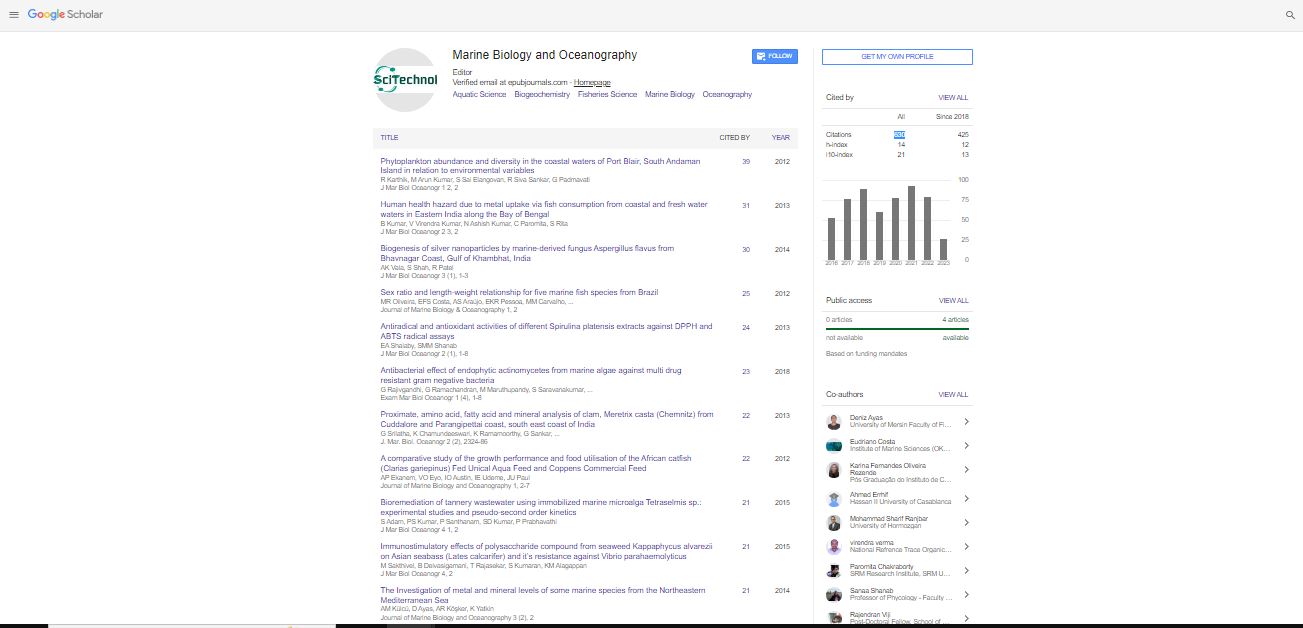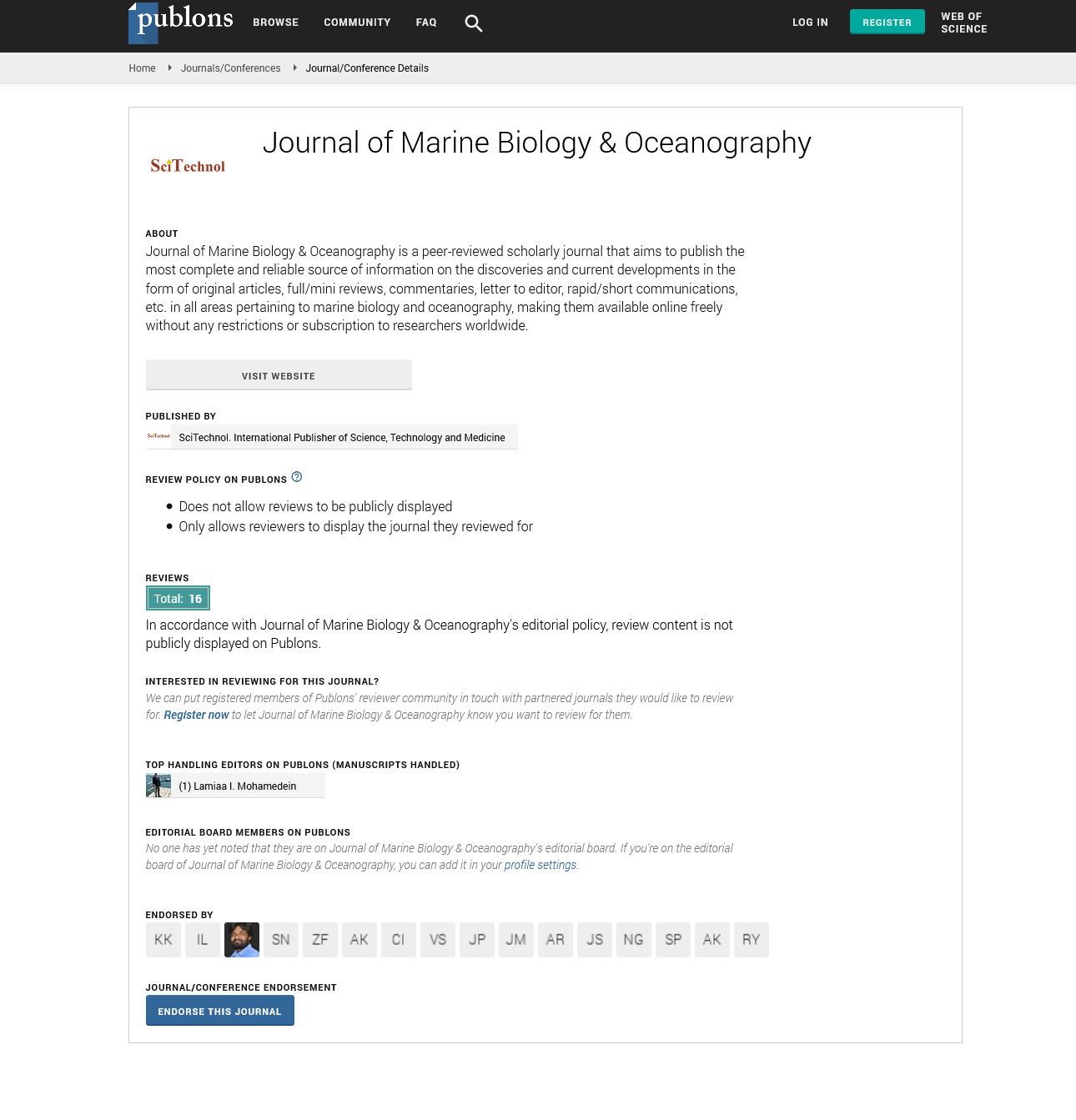Opinion Article, J Mar Biol Oceanogr Vol: 12 Issue: 3
Freshwater Ecology: Types, Applications, and Impacts on Aquatic Ecosystems
Alan Benjamin*
1Department of Zoology, University of Wyoming, Laramie, United States of America
*Corresponding Author: Alan Benjamin,
Department of Zoology, University of
Wyoming, Laramie, United States of America
E-mail: alan_benjamin@uw21.edu
Received date: 22 May, 2023, Manuscript No. JMBO-23-105094;
Editor assigned date: 25 May, 2023, PreQC No. JMBO-23-105094 (PQ);
Reviewed date: 08 June, 2023, QC No. JMBO-23-105094;
Revised date: 15 June, 2023, Manuscript No. JMBO-23-105094 (R);
Published date: 22 June, 2023, DOI: 10.4172/2324-8661.1000270
Citation: Benjamin A (2023) Freshwater Ecology: Types, Applications, and Impacts on Aquatic Ecosystems. J Mar Biol Oceanogr 12:3.
Description
Freshwater ecosystems, comprising lakes, rivers, wetlands, and streams, play an essential role in supporting diverse life forms and maintaining ecological balance. Freshwater ecology encompasses the study of these habitats, their unique characteristics, the various types of organisms they support, and the applications of this knowledge for environmental conservation and management. Understanding freshwater ecology is essential for ensuring the sustainability of these ecosystems and mitigating the impacts of human activities. Freshwater ecosystems can be broadly classified into standing water systems, such as lakes and ponds, and flowing water systems, including rivers and streams. Each type presents distinct physical and chemical characteristics that shape the ecological dynamics within.
Lakes and ponds are characterized by their still or slow-moving waters, which allow for the development of stratification. This stratification gives rise to distinct ecological zones, including the littoral zone near the shoreline, the limnetic zone in the open water, and the profundal zone in deeper areas. These zones support a wide array of organisms, from emergent vegetation and fish in the littoral zone to phytoplankton and zooplankton in the limnetic zone.
Rivers and streams, on the other hand, are characterized by their flowing waters, which develop a dynamic environment with varying water velocities. The flow of water influences the distribution of organisms, with riffles and runs providing oxygen-rich habitats for fish and invertebrates, while pools provide shelter and refuge. The interconnected nature of river networks enables the movement of organisms, energy, and nutrients throughout the system, making them vital corridors for biodiversity. Freshwater ecology has numerous practical applications in various fields, ranging from environmental management to water resource planning. Understanding the ecological requirements of different freshwater organisms helps in the conservation and restoration of aquatic habitats. By identifying key species and their ecological roles, conservation efforts can be targeted to protect and enhance biodiversity.
Freshwater ecology provides tools and methodologies for assessing water quality. Monitoring indicators, such as the presence of specific organisms or changes in species composition, can help identify pollution sources and evaluate the overall health of aquatic ecosystems. Knowledge of freshwater ecology is important for planning and implementing ecosystem restoration projects. By understanding the natural processes and interdependencies within a freshwater system, restoration efforts can be designed to enhance ecosystem functions and improve habitat quality. Freshwater ecology contributes to the sustainable management of fish populations. By studying the ecological requirements of different fish species, studies can develop strategies to protect spawning grounds, regulate fishing practises, and promote habitat restoration.
Human activities have significant impacts on freshwater ecosystems, often leading to the degradation and loss of vital habitats. Pollution from industrial and agricultural sources introduces harmful substances into freshwater systems, impairing water quality and endangering aquatic life. Excessive nutrient runoff, for instance, can cause algal blooms, deplete oxygen levels, and disrupt the balance of the ecosystem.
Water extraction for domestic, agricultural, and industrial purposes can alter the natural flow regime of rivers, leading to reduced water availability downstream and affecting the survival of aquatic organisms. Additionally, the construction of dams and reservoirs can disrupt river connectivity, hindering the movement of migratory species and altering the natural sediment transport processes.
Conclusion
Freshwater ecology provides valuable insights into the types, functions, and applications of these vital ecosystems. By understanding the ecological dynamics within freshwater habitats, one can make informed decisions to conserve and manage these resources sustainably. The applications of freshwater ecology extend to various sectors, including conservation, water quality assessment, ecosystem restoration, and fisheries management. However, it is important to recognize and reduce the impacts of human intervention on freshwater ecosystems to ensure their long-term health and the well-being of the organisms that depend on them. Through responsible stewardship and understanding, one can strive to protect and preserve these invaluable freshwater habitats for future generations.
 Spanish
Spanish  Chinese
Chinese  Russian
Russian  German
German  French
French  Japanese
Japanese  Portuguese
Portuguese  Hindi
Hindi 
